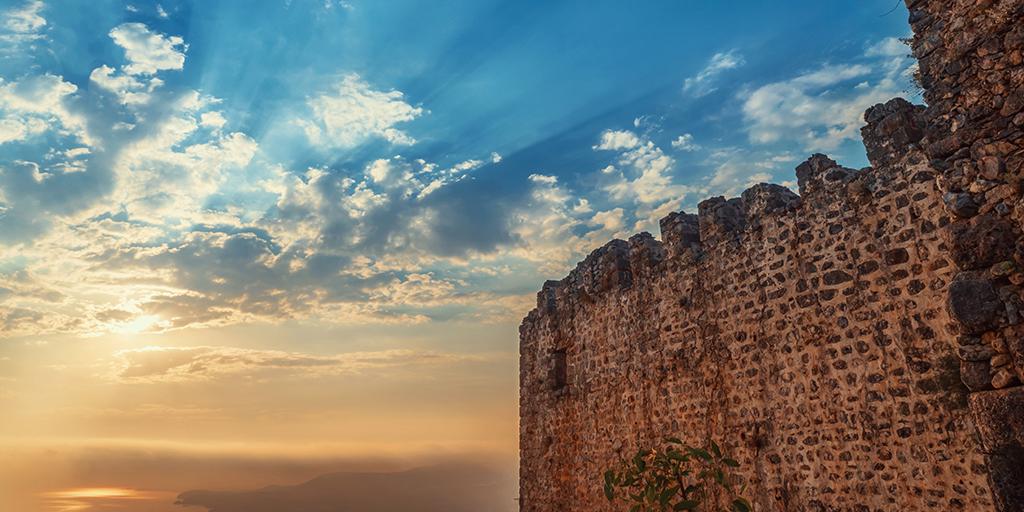
Insecure Walls
Walls are useful things, keeping us safe and comfortable while providing privacy and protection—along with space for hanging pictures. But not all walls can be trusted, no matter how mighty or ingeniously built.
There are many famous walls in history. The Great Wall of China, the largest manmade wall, is ranked as one of the wonders of the world—but it failed to stop invaders on several occasions. The Walls of Babylon were impressive and among the mightiest of man’s ancient works—but the Ishtar Gate to the inner city of Babylon is now merely ruins, with a partial reconstruction using the original materials now residing in the Pergamon Museum in Berlin. Babylon’s walls fell, and the city was conquered by Cyrus the Great in 539 BC. The walls of ancient Troy were breached by stealth, and Hadrian’s Wall, constructed by the Romans as a defense against Scotland, fell to abandonment. Remaining parts of it are still a tourist attraction.
One most infamous “wall,” the Maginot Line, was built by France against German forces in World War II—a barricade of steel, guns, concrete, and human soldiers, determined to stop Hitler’s forces in their tracks. But with ruthless efficiency, the German military circumvented it and proved General George S. Patton’s declaration that “fixed fortifications are a monument to the stupidity of man.”
The Berlin Wall, built during the Cold War, divided East and West Germany with the intention of keeping East Berliners from escaping to the West. It was breached countless times and fell completely in less than thirty years.
Today, many Americans want a wall to secure the Mexico-United States border from illegal immigration, a divisive issue that has played a part in several recent elections. Proponents cite the U.S. Constitution requiring the government to protect all states against invasion, but others argue that building a wall is expensive and can defend only a small portion of the U.S. border, and many believe it to be “exclusive” or discriminatory. Many on both sides doubtless realize that determined migrants will still try to breach the wall or enter elsewhere. Nations in Europe, Africa, and the Middle East face similar situations, and the governments of the United Kingdom and the European Union wrestle with political debate and public concern.
In the Bible, walls have a tendency of falling down. Tyre’s walls were completely broken, and the city was “scraped like the top of a rock” (Ezekiel 26:4–5, 14). The walls of Jericho fell flat (Joshua 6:20; Hebrews 11:30). The walls of Jerusalem fell more than once, though the Western Wall in the Old City of Jerusalem remains to this day.
Manmade walls do seem to bring a false sense of security, which provides a warning that Scripture uses to powerful effect. Deuteronomy 28 records blessings for obedience and curses for disobedience. One curse is that God will bring another nation to conquer the disobedient nation. “They shall besiege you at all your gates until your high and fortified walls, in which you trust, come down” (v. 52). Ezekiel prophesied against false prophets who plaster “a wall with un-tempered mortar” and cry “Peace!” when there is no peace. God declares that their wall will fall by wind, hail, and flooding rain (Ezekiel 13:10–11). Only one “wall” can be trusted—the wall of protection from Almighty God.
Consider Asa, king of Judah, as one example. Because Asa obeyed and sought God, he did build walls around the cities of Judah, but it was the Lord who had given them “rest on every side” (2 Chronicles 14:7). Many scriptures speak of God’s protection for those who love and obey Him. To them, He is a guard, a fortress, and a bulwark against all foes—one that will be sorely needed in times to come.
The Bible prophesies a time of destruction like no other, after which Christ will return and mankind will finally yield, repent, and obey Him. In the Tomorrow’s World study guide Armageddon and Beyond, the late evangelist Richard F. Ames wrote, “You need to watch world events as they relate to Bible prophecy. And you need to pray that you will be able to stand before Christ at His coming. God gives us a choice: ‘I call heaven and earth as witnesses today against you, that I have set before you life and death, blessing and cursing; therefore choose life, that both you and your descendants may live’ (Deuteronomy 30:19)” (p. 43).
When Christ returns, ruins will be rebuilt, and Jerusalem, now a walled city, will then “be inhabited as towns without walls” because the Lord Himself “will be a wall of fire all around her” (Zechariah 2:4–5). Later, the New Jerusalem will descend from Heaven having “a great and high wall” (Revelation 21:12), but its gates will not be shut (v. 25), and nothing will defile it (v. 27).
If you want the free study guide mentioned in this article, you can order your free copy at the link provided or read it online at your convenience. You may also be interested in the telecast “Humanity’s Last Hope.”
Stay up to date with our Weekly Digest Email!
Tomorrow's World ComMentary Podcast
Subscribe to Tomorrow's World Commentary podcasts on iTunes and Google Play!



